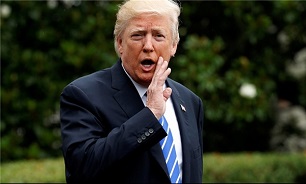London Mayor Accuses US President of Behaving Like Kids
 Khan said on Saturday that he had no idea what Trump’s
"beef" with him is about, adding that he was really "disappointed” by
the president’s remarks about him in the aftermath of London’s deadly terrorist
attack in early June.
Khan said on Saturday that he had no idea what Trump’s
"beef" with him is about, adding that he was really "disappointed” by
the president’s remarks about him in the aftermath of London’s deadly terrorist
attack in early June.
Trump came under fire early June for criticizing London's mayor in the aftermath of attacks in the city that killed seven people and injured at least 48 others.
In a tweet, Trump seized on comments by London Mayor Sadiq Khan, who said Britons should not be alarmed to see more police in the streets after three men drove a van into pedestrians on London Bridge before stabbing others nearby.
"At least 7 dead and 48 wounded in terror attack and Mayor of London says there is 'no reason to be alarmed!'" Trump tweeted.
"We must stop being politically correct and get down to the business of security for our people. If we don't get smart it will only get worse," Trump said.
US leader also attacked the media for supporting Khan, saying they were "working hard” to sell the mayor's argument.
In response, a Spokesperson for the London mayor said Khan "is busy working with the police, emergency services and the government to coordinate the response to this horrific and cowardly terrorist attack."
"He has more important things to do than respond to Donald Trump's ill-informed tweet that deliberately takes out of context his remarks urging Londoners not to be alarmed when they saw more police - including armed officers - on the streets," the Spokesperson added.
US President renewed his Twitter attacks on Sadiq Khan, the second time in less than 48 hours since a terrorist attack in the British capital.
Trump accused Khan, the first Muslim mayor of the city, of offering a "pathetic excuse" for remarks that the US president misinterpreted about policing in response to Saturday's attack that left several people dead.
US President tweeted that Khan had to "think fast” to excuse comments that Londoners need not be alarmed after the deadly attack.
Trump is deeply unpopular in Britain, and he would probably face wide-scale protests during a visit to the country. Recent surveys have found that more than half of people in the UK believe US President is a threat to global stability.
Besides holding large demonstrations across the UK, hundreds of thousands of Britons signed an online petition back then that called on the UK Parliament to ban Trump from visiting the country.
A British newspaper reported mid-July that Trump told UK Prime Minister Theresa May he will not visit London for his controversial state visit until he is guaranteed a "better reception" amid fears of popular protests.
Trump told May during a phone call that she should prepare a "warm welcome" before he agrees to set a date for a state visit, The Sun reported, citing the transcript of a conversation seen by high-ranking diplomats.
"I haven't gotten great coverage there lately, Theresa," Trump told May, while she responded to him: "Well, you know what the British press are like".
"I still want to come, but I'm in no rush," US President said, adding that "So if you can fix it for me, it would make things a lot easier. When I know I'm going to get better reception, I'll come and not before."
According to the British tabloid, May explained to Trump that she had no control over what the British media report about him.
UK Prime Minister extended Queen Elizabeth II’s invitation to Trump during a visit to the White House only a week after US President's inauguration in January.
British activists, lawmakers and trade unions have also chimed in and vowed to hold the largest demonstrations in UK history in case Trump made the visit.
Reports emerged in early June that Trump has informed May that he would not travel to Britain until nationwide public protests against him come to an end.
UK Labour leader Jeremy Corbyn called Trump a "threat” to the world and stressed that he should not be allowed in to Britain because of his "reckless” policies, specifically his ill-fated visa ban against people from several Muslim countries.
London Mayor has also called for the visit to be cancelled after Trump’s controversial response to London terrorist attacks, which involved direct criticism of the way the city was run.
